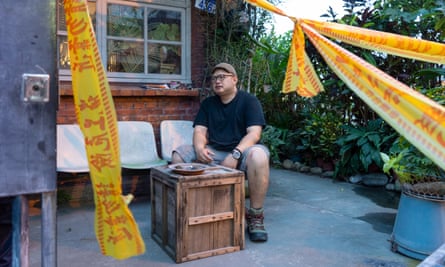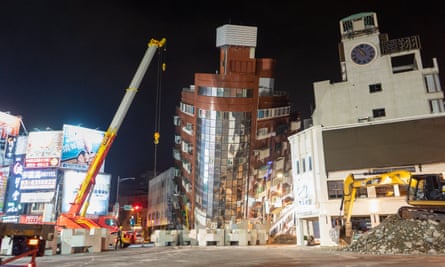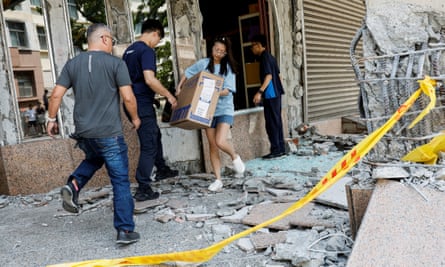Lying in his bed, Liao Xiu Bo wondered if he was about to die. As a powerful earthquake rocked the ground beneath him, he tried to escape his house. “Am I going to be crushed?” he asked himself, before gathering the courage to run down the stairs, which swayed beneath his feet.
Outside, he could see that the wall surrounding his house had collapsed, its bricks littered across the road. “That’s when I realised how extreme the earthquake was.”
Liao’s house in Hualien, a popular tourist city on the east coast of Taiwan, was just a few miles from the epicentre of the 7.2-magnitude quake that struck on Wednesday morning. The quake has left more than 1,000 people injured and at least 10 dead. On Friday, rescuers were still looking for 18 people missing.
“In Hualien, earthquakes are a part of everyday life,” Liao said. “But this earthquake was different from the others.” And worse was to come.

As Liao assessed the damage to his home on Wednesday morning, he saw on the news that the Uranus building, only a few blocks away, had partly collapsed.
His thoughts immediately went to his friend and longtime customer at his bar who lived in the building. “I started calling her but I couldn’t get through. I recorded a short voice memo and said: ‘I saw the news. Can you send me a message? I’m really worried if you’re safe.’”
She never responded.
Having initially escaped the crumbling building, she had returned to rescue her cat, only for the walls to collapse around her, Liao said. “She was only 33 years old. She was such a bright and kind-hearted person. When I heard the news, I felt like I’d lost a family member.”
In the east of the city, next to a normally bustling night market, the 10-storey Uranus is slumped at an awkward angle after its lower floors collapsed during the quake. The building, now being prepared for demolition, has come to represent the damage wreaked by the largest earthquake to hit Taiwan in 25 years.

It is among the 176 buildings across Hualien that have been damaged or destroyed because of the quake, which has also left about 337 households without electricity and 3,750 without water, according to local government officials.
As the earthquake began, Li Gomez, 47, was on the eighth floor of her hotel with her husband and two young daughters. “The pipes had burst and water was pouring in. Things were falling off the wall and the whole building was shaking violently,” she said.
“One of the workers in the hotel grabbed my daughter while I tried to get the door open, and then my husband ran over to get our other daughter. We ran out; we didn’t even think about putting our shoes on.”

They made their way to the train station but struggled to find a route out of the city. Many of the roads in and around Hualien, as well as the train lines linking to neighbouring cities, had sustained significant damage.
Unable to leave, they found themselves among the 213 displaced people scattered across makeshift rescue centres in schools and other municipal buildings.
Tending to her 94-year-old husband, Song De You, 66, said she left behind all her belongings when she came to the rescue centre in Zhonghua elementary school.
“I only brought my husband’s necessities and medicines with us because he has cancer,” she said of her spouse, who uses a wheelchair.
With the number of aftershocks exceeding 300, and 76 buildings at risk of collapse, the number of people seeking shelter could increase over the coming days. “I can feel the earthquake in me as if it’s still happening. I feel dizzy and everything is still moving,” Song said.
As residents in Hualien slowly return to life as normal, emergency services are working to rescue dozens of people who remain trapped in the mountains in nearby Taroko national park.
“Hualien is a beautiful mountain and water environment,” said Jaw-Yeuan Wu, the chief of the Hualien County fire department, coordinating the rescue effort. “But all these environments have a problem in common – they are particularly prone to rockslides, which is what has happened now.
“Because the places where people have become stranded are all relatively remote, they are not easily reached by first responders or communication equipment.”
With regular aftershocks shaking Hualien and bad weather setting in, the risk of landslides leaves rescuers racing against time. “If we don’t get the trapped people out fast enough the first time, they could be injured a second or third time when the aftershocks take place,” the fire chief said.
Source: theguardian.com


